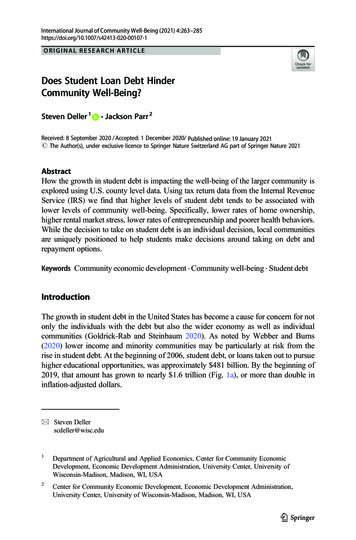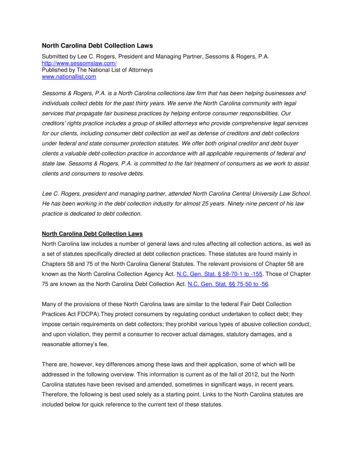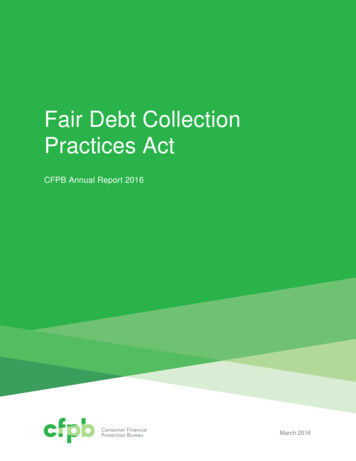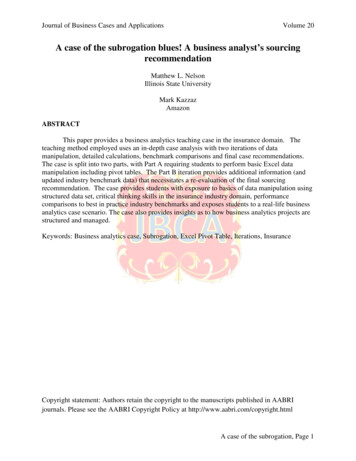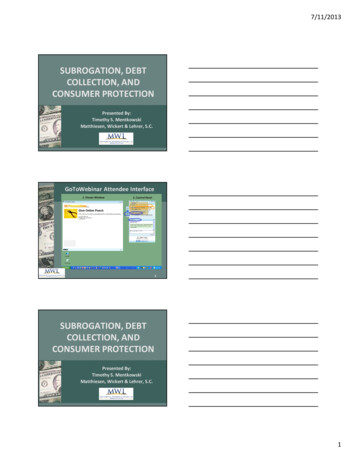
Transcription
7/11/2013SUBROGATION, DEBTCOLLECTION, ANDCONSUMER PROTECTIONPresented By:Timothy S. MentkowskiMatthiesen, Wickert & Lehrer, S.C.GoToWebinar Attendee Interface1. Viewer Window2. Control Panel2SUBROGATION, DEBTCOLLECTION, ANDCONSUMER PROTECTIONPresented By:Timothy S. MentkowskiMatthiesen, Wickert & Lehrer, S.C.1
7/11/2013FAIR DEBT COLLECTION PRACTICES ACT(FDCPA)15 U.S.C. § 1692, et seq.Purpose: To “eliminate abusive debt collectionpractices by debt Collectors, to insure that those debtcollectors who refrain from using abusive taged, and to promote consistent Stateaction to protect consumers against debt collectionsabuses.” § 1692(d). Abusive PracticesDebt CollectorConsumer TransactionAbusive Practices4CONSUMER DEBTDebt: “[A]ny obligation or alleged obligation of aconsumer to pay money arising out of a transaction inwhich the money, property, insurance, or services whichare the subject of the transaction are primarily forpersonal, family, or household purposes, whether ornot such obligation has been reduced to judgment.” §1692a(5).Consumer Transaction:Money for te: Consumerdebts reduced tojudgment still fallunder FDCPA.5DEBT COLLECTORDebt Collector: “[A]ny person who uses anyinstrumentality of interstate commerce or the mailsin any business the principal purpose of which is thecollection of any debts, or who regularly collects orattempts to collect, directly or indirectly, debtsowed or due or asserted to be owed or dueanother.” § 1692a(6).62
7/11/2013PERTINENT EXCEPTIONS“Debt Collector” does not include:“Any officer or employee of a creditor while, in thename of the creditor, collecting debts for suchcreditor.” § 1692a(6)(A);OR“Any person collecting or attempting to collect anydebt owed or due or asserted to be owed or dueanother to the extent such activity concerns a debtwhich was not in default at the time it was obtainedby such person.” § 1692a(6)(F)(iii).7LAWYERS AS DEBT COLLECTORS Attorneys are not exempt from the FDCPA –any person who regularly collects debts owedor due another.– “Regular” collection of debts, two approaches: Frequency: Requires only “steady” collection ofdebts, regardless of whether it is a substantialportion of the attorney or firm’s business. SeeSilvia v. Mid Atlantic Management Corp., 277 F.Supp.2d (E.D. Pa. 2003). Aggregate: Looks to the percentage of thealleged debt collector’s business. See Schroyerv. Frankel, 197 F.3d 1170 (6th Cir. 1999).8REQUIREMENTS ANDPROHIBITED PRACTICES Disclosure: The “debt collector” must disclose incommunications with the debtor, written or oral,“that the debt collector is attempting to collect adebt and that any information obtained will beused for that purpose .” §1692e(11).– Applies to both initial and subsequentcommunications, except formal pleadings.93
7/11/2013REQUIREMENTS ANDPROHIBITED PRACTICES Verification: Within five (5) days of the initialcommunication to the debtor, the debt collectormust send a written notice containing:– The amount of the debt;– The name of the creditor;– A statement that if the consumer notifies the debtcollector within thirty (30) days that the debt isdisputed, the debt collector will send verification ofthe debt or a copy of a judgment; and– A statement that upon the consumer’s writtenrequest within thirty (30) days, the debt collectorwill provide the name and address of the originalcreditor. §1692g(a).10REQUIREMENTS ANDPROHIBITED PRACTICES False Or Misleading Representations– Threat to take action that cannot legally betaken or is not intended to be taken.§1692e(5).– False representation or implication thatdocuments are legal process. § 1692e(13).Note: This is notan exhaustive list.See the Act forfurther details.11REQUIREMENTS ANDPROHIBITED PRACTICES Is contacting the debtor’s attorneys subject theAct?– Answer: It depends on the jurisdiction. Yes: Communication is defined broadly andincludes the conveying of information bothdirectly and indirectly. Sayyed v. Wolpoff &Abramson, 485 F.3d 226 (4th Cir. 2007). No: The Act aims to protect unsophisticateddebtors, and their attorney acts as anintermediary with the desired level ofsophistication. Guerrero v. RJM Acquisitions, LLC,499 F.3d 926 (9th Cir. 2007).124
7/11/2013PENALTIES AND ENFORCEMENT§ 1692k Actual Damages Additional Damages Up To 1,000 Costs And Attorneys’ Fees13SUBROGATION CLAIMS AS “DEBTS”I: PURSUING THE TORFEASOR Hawthorne v. Mac Adjustments, Inc., 140 F.3d1367 (11th Cir. 1998).– Motor Vehicle Accident– Liberty Mutual Paid Insured Driver’s Claim– Subrogation Claim Referred to Third-PartyAdministrator (TPA)– TPA Sent Demands To Negligent Driver,Hawthorne.14SUBROGATION CLAIMS AS “DEBTS”I: PURSUING THE TORFEASOR Hawthorne v. Mac Adjustments, Inc., 140 F.3d1367 (11th Cir. 1998).– Holding: The FDCPA does not apply to a TPA’scommunications to an alleged tortfeasorbecause the payment obligation is not a “debt.” There must be a debt to state a claim under theFDCPA, which requires a consumer transaction.– “[A]t a minimum, a ‘transaction’ under the FDCPAmust involve some kind of business dealing orother consensual obligation ” Id. at 1371. Hawthorne’s obligation arose out of tort –negligent driving – not a consumer transaction.155
7/11/2013POST-HAWTHORNE TORTBASIS DECISIONS Shaw v. Credit Collection Services, 2008 WL 2941261 (M.D. La.2008) (not reported) (TPA’s subrogation claim against driverliable for Allstate’s loss sustained in motor vehicle accidentwas based in tort and was not “debt,” citing Hawthorne). Antoine v. State Farm Mut. Auto Ins. Co., 662 F. Supp.2d 1318(M.D. Fla. 2009) (alleged negligent driver’s FDCPA claimagainst State Farm for efforts to collect state court judgmentdebt stated no cause of action because obligation arose fromtort claim). Taylor v. Javitch, Block & Rathbone, LLC, 2012 WL 2375494(N.D. Ohio 2012) (not reported) (TPA’s pursuit of defaultjudgment on subrogation tort lawsuit not governed by FDCPAbecause no consumer transaction, citing Hawthorne).16SUBROGATION CLAIMS AS “DEBTS”II: PURSUING THE INSURED Hamilton v. United Healthcare of Louisiana,Inc., 310 F.3d 865 (5th Cir. 2002).– Single-Vehicle Car Accident Injuring Hamilton– Group Health Plan Paid Medical ExpenseBenefits– Subsequent UM And Med Pay Claims– Plan’s TPA Asserted Lien On Proceeds17SUBROGATION CLAIMS AS “DEBTS”II: PURSUING THE INSURED Hamilton v. United Healthcare of Louisiana, Inc.,310 F.3d 865 (5th Cir. 2002).– Holding: The FDCPA may apply because the healthPlan’s subrogation lien claim does constitute a“debt” under the FDCPA. Hamilton’s father purchased group healthinsurance for himself and his dependents, whichfalls under “personal, family, or household use.” The obligation arose out of that purchase – aconsumer transaction.– Remanded on issue of .186
7/11/2013SUBROGEES AS “DEBT COLLECTORS” Hamilton v. Trover Solutions, Inc., 2003 WL21105100 (E.D. La. 2003).– Question on Remand: The subrogation claim isa “debt,” but is the TPA a “debt collector”?– Opinion and Order: No, it is not because theTPA acquired the debt prior to “default.” Look to the exclusion from § 1692a(6)(F)(iii):“Any person collecting or attempting to collectany debt owed or due another to the extentsuch activity concerns a debt which was not indefault at the time it was obtained by suchperson.”19SUBROGEES AS “DEBT COLLECTORS” Hamilton v. Trover Solutions, Inc., 2003 WL21105100 (E.D. La. 2003).– “Default” occurs when the insured receivessettlement or judgment proceeds and refuses topay the subrogation or reimbursement claim.– The Plan transmitted the claim to the TPA prior tothe insured’s receipt of settlement funds.– The TPA is not a “debt collector” by virtue of theexception. Affirmed by the 5th Circuit in Hamilton v. TroverSolutions, Inc., 10 Fed. Appx. 942 (2004) (notreported).20SUPPLEMENTAL “PRE-DEFAULT” CASES Healy v. Jzanus, Ltd., 2006 WL 898067 (E.D. N.Y. 2006) (notreported) (TPA was exempt from “debt collector” status forpurposes of FDCPA where TPA obtained medical billing “debt”“pre-default”, even though TPA was a registered debt collectorand included FDCPA verification language in letters toplaintiff). Kesselman v. The Rawlings Co., LLC, 668 F. Supp.2d 604 (S.D.N.Y. 2009) (TPAs for ERISA Plans asserting subrogation andreimbursement rights against Plan participants were not “debtcollectors” where “debts” were obtained prior to “default”). Dantin v. Rawlings Co., LLC, 2005 WL 6075786 (M.D. La. 2005)(not reported) (FDCPA did not apply to a TPA’s subrogationrecovery efforts against insured where debt obtained prior to“default”).217
7/11/2013ANOTHER NOTEWORTHYEXECEPTION Vasquez v. Allstate Ins. Co., 937 F. Supp. 773(N.D. Ill. 1996).– Allstate’s subrogation personnel sentsubrogation demand letters to allegedtortfeasor, which contained FDCPA language.– Insurer’s own personnel fall under §1692a(6)(A), as employees or agents of thecreditor.– Expresses non-controlling opinion that claimagainst the third party is likely a “debt,” butthis pre-dates Hawthorne.22FDCPA AND SUBROGATIONOVERVIEW Can the FDCPA apply to actions of:– A Subrogee’s Employee? – NO– A Third-Party Administrator (TPA)? – YES– An Attorney? – YES Claims Against:– A Third Party? – NO– An Insured? – YES When the claim is obtained:– Prior To Settlement or Judgment? – NO– After Settlement or Judgment? - YES23EXAMPLE 1 Ivan Insured is rear-ended by Tom Tortfeasor. Hisauto carrier, Acme Casualty, pays for the damageto Ivan’s vehicle. After the claim is paid, SallySubro sends several subrogation letters to Tom,demanding payment for the property damage.Are Sally’s activities subject to the FDCPA?– No. Sally is an employee of Acme Casualty, andtherefore excepted from the definition of “debtcollector.” Additionally, Acme’s claim against Tomarose out of a tort, not a consumer transaction, sothere is no “debt.”248
7/11/2013EXAMPLE 2 Ivan Insured is rear-ended by Tom Tortfeasor.As a result, he has soft tissue injuries requiringchiropractic treatments. Acme Casualty paysthe chiropractor bills under its medicalpayments coverage. Ivan later files a claimagainst Tom’s liability carrier and receives agenerous settlement. Sally demands repaymentof Acme’s subrogation lien from the proceeds.Are her actions subject to the FDCPA?– No. Again, as an employee of Acme, she is nota “debt collector.”25EXAMPLE 3 Ben O’Ficiary has just eaten at his favorite ice creamparlor, Banana Splitz, and on his way to the parking lot,he slips on a banana peel and breaks his leg. His healthinsurer, Group General, pays for a number of surgeries.Recognizing subrogation potential, Group General refersthe claim to Reliable Recovery, a TPA. Reliable sendssubrogation notices to Banana Splitz, Ben, and Ben’sattorney. Ben later receives a moderate settlement andrefuses to pay the lien. Are Reliable Recovery’s activitiessubject to the FDCPA?– No. Reliable obtained the “debt” prior to “default”because they took over the subro efforts before Bensettled the claim. Hence, they are not a “debt” collector.26EXAMPLE 4 Same facts as Example 3, but rather than referring the fileto Reliable Recovery, Group General pursues subro on itsown, prior to and throughout Ben’s lawsuit. After settlingwith the adverse carrier, Ben still refuses to reimburseGroup General. Needing some assistance, Group Generalretains Reliable Recovery, who contacts Ben to demandreimbursement. Are Reliable Recovery’s activities nowsubject to the FDCPA?– Yes, at least in theory. Reliable is not an employee or agent ofGroup General, the “debt” is based on a consumer transactionfor health insurance, and they began handling the file after Benreceived the settlement funds and refused to pay. However,note that there is currently no case law with these particularfacts, and no published decision to date has held a subrogationagent liable under the FDCPA.279
7/11/2013STATE DEBT COLLECTION, TRADEPRACTICES, AND CONSUMER PROTECTION Texas: Twice rejected application of Texas DebtCollection Act. Tex. Fin. Code § 392.001, et seq.Dickey v. Healthcare Recoveries, Inc., 1998 WL 20728(Tex. Ct. App. 1998); Trevino v. Credit CollectionServices, 2007 WL 2265069 (Tex. Ct. App. 2007). Florida: In Antoine, 662 F. Supp. 1318 (M.D. Fla.2009), supra, the Court held that there is no claim forFlorida Consumer Collection Practices Act where theobligation is based in tort. Louisiana: Shaw, 2008 WL 2941261 (M.D. La. 2008)held that the Louisiana Uniform Trade Practices Actdid not apply where the claim arose from tort.28STATE DEBT COLLECTION, TRADEPRACTICES, AND CONSUMER PROTECTION California: Camacho v. Automobile Club of SouthernCalifornia, 142 Cal.App.4th 1394 (Cal. Ct. App. 2006).– TPA and auto insurers sent subrogation demandletters to an uninsured driver to recoup UM benefits.– Suit brought under Cal. Bus. And Prof. Code § 17200[Unfair Competition].– Fact-intensive three-prong test applied to determine“unfairness.” The consumer injury must be substantial; The injury must not be outweighed by anycountervailing benefits to consumers or competition;and The injury must be one that consumers themselvescould not reasonably have avoided.29STATE DEBT COLLECTION, TRADEPRACTICES, AND CONSUMER PROTECTION California: Camacho v. Automobile Club of SouthernCalifornia, 142 Cal.App.4th 1394 (Cal. Ct. App. 2006).– Camacho did not dispute his liability, so there was noviolation of his rights and therefore no injury.– Societal benefit of collecting sums owed by anuninsured motorist outweighed any alleged “injury”the plaintiff may have suffered.– Plaintiff’s “injury” could have been reasonablyavoided by procuring insurance as the law requires.Thus the practices complained of were not “unfair.”Id. at 1405-06.3010
7/11/2013STATE DEBT COLLECTION, TRADEPRACTICES, AND CONSUMER PROTECTION California: Camacho v. Automobile Club ofSouthern California, 142 Cal.App.4th 1394 (Cal. Ct.App. 2006).– Plaintiff alleged non-compliance with California’sFDCPA, Cal. Civ. Code § 1788, et seq., but did notbring claim. Therefore, the Court expressed noopinion on the Act’s application.– California Attorney General filed an amicus brief inthe case which argued that the subrogateddefendants should be liable.– No distinction made between tort and contractbasis for subrogation claim.31STATE DEBT COLLECTION, TRADEPRACTICES, AND CONSUMER PROTECTION Colorado: An informal staff advisory opinionfrom the Colorado Administrator of theCollection Agency Board (a subdivision of theDepartment of Law) rejected the federalrationale with regard to the Colorado Fair DebtCollection Practices Act. C.R.S. §§ 12-14-101, etseq. (2003). The Administrator reasoned that atort constitutes a “transaction” under the Act, soit may be a basis for a “debt,” or alternativelythat “the transaction may be considered theinsured’s insurance purchase.”32STATE DEBT COLLECTION, TRADEPRACTICES, AND CONSUMER PROTECTION Hawaii: Flores v. Rawlings Co., LLC, 117 Haw. 153(Haw. 2008) held that subrogation TPAs must registerwith the State as “collection agencies,” but deniedthe right to bring suit in the absence of an “injury.”– May be distinguishable because the decision relied on thefact that the subrogated carrier made the insureds sign“loan agreements” after receiving treatment, whichgranted subrogation rights (i.e., “consumer transaction”).– No injury to plaintiff and enforcement of registrationrequirements “is in the hands of the Attorney Generaland the Director of the Office of Consumer Protection.”Id. at 171.– No violation of statutes other than failure to register.3311
7/11/2013STATE DEBT COLLECTION, TRADEPRACTICES, AND CONSUMER PROTECTION Washington: Liberal Construction of State Law Stephens v. Omni Ins. Co., 138 Wash. App. 151 (Wash.Ct. App. 2007), two alleged tortfeasors brought suitagainst a pair of insurers and their common TPA forviolation of the Washington Consumer Protection Act(CPA), RCW § 19.86.020. The TPA had sent the plaintiffsa number of demands which appeared to be formalcollection notices, displayed increasing urgency, andthreatened a number of legal actions.– The CPA outlaws “unfair or deceptive acts or practices inthe conduct of any trade or commerce.” Additionalelements of the claim include public interest impact andinjury to the plaintiff’s business or property.34STATE DEBT COLLECTION, TRADEPRACTICES, AND CONSUMER PROTECTION Washington: Stephens v. Omni Ins. Co., 138 Wash. App.151 (Wash. Ct. App. 2007).– The styling of the letters as collection notices was“deceptive.”– No privity requirement - “trade or commerce” was construedextremely liberally. That the TPA was selling any assets orservices to anyone which indirectly affected the people ofthe State of Washington suffices.– Injury requirement may be satisfied by the time and expenseof procuring a credit report or speaking with an attorney.– Recognized that neither the FDCPA, the WashingtonCollection Agency Act (CAA), nor Washington’s InsuranceCode applied to subro recovery efforts, but still reasonedthat the CPA should address what those Acts do not.35STATE DEBT COLLECTION, TRADEPRACTICES, AND CONSUMER PROTECTION Washington: Panang v. Farmers Ins. Co. ofWashington, 166 Wash.2d 27 (2009), Stephenstaken up on appeal by the Supreme Court.– Rejects distinction between “tort adversaries”and consumer relationships.– Circular reasoning that the CPA should apply tosubrogation recoveries because consumersbelieve that the FDCPA and CAA will protectthem. See the dissent for a poignant rebuke ofthe majority’s “reasoning.”3612
7/11/2013POTENTIAL ISSUES AND PROBLEMS Workers’ CompensationERISAPractical Aspects of FDCPA ApplicationInteraction of State and Federal Law37SUBROGATION, DEBT COLLECTION,AND CONSUMER PROTECTIONPresented By:Timothy S. MentkowskiMatthiesen, Wickert & Lehrer, S.C.tmentkowski@mwl-law.comwww.mwl-law.com3813
7/11/2013SUBROGATION, DEBTCOLLECTION, ANDCONSUMER PROTECTIONPresented By:Timothy S. MentkowskiMatthiesen, Wickert & Lehrer, S.C.GoToWebinar Attendee Interface1. Viewer Window2. Control Panel2SUBROGATION, DEBTCOLLECTION, ANDCONSUMER PROTECTIONPresented By:Timothy S. MentkowskiMatthiesen, Wickert & Lehrer, S.C.1
7/11/2013FAIR DEBT COLLECTION PRACTICES ACT(FDCPA)15 U.S.C. § 1692, et seq.Purpose: To “eliminate abusive debt collectionpractices by debt Collectors, to insure that those debtcollectors who refrain from using abusive taged, and to promote consistent Stateaction to protect consumers against debt collectionsabuses.” § 1692(d). Abusive PracticesDebt CollectorConsumer TransactionAbusive Practices4CONSUMER DEBTDebt: “[A]ny obligation or alleged obligation of aconsumer to pay money arising out of a transaction inwhich the money, property, insurance, or services whichare the subject of the transaction are primarily forpersonal, family, or household purposes, whether ornot such obligation has been reduced to judgment.” §1692a(5).Consumer Transaction:Money for te: Consumerdebts reduced tojudgment still fallunder FDCPA.5DEBT COLLECTORDebt Collector: “[A]ny person who uses anyinstrumentality of interstate commerce or the mailsin any business the principal purpose of which is thecollection of any debts, or who regularly collects orattempts to collect, directly or indirectly, debtsowed or due or asserted to be owed or dueanother.” § 1692a(6).62
7/11/2013PERTINENT EXCEPTIONS“Debt Collector” does not include:“Any officer or employee of a creditor while, in thename of the creditor, collecting debts for suchcreditor.” § 1692a(6)(A);OR“Any person collecting or attempting to collect anydebt owed or due or asserted to be owed or dueanother to the extent such activity concerns a debtwhich was not in default at the time it was obtainedby such person.” § 1692a(6)(F)(iii).7LAWYERS AS DEBT COLLECTORS Attorneys are not exempt from the FDCPA –any person who regularly collects debts owedor due another.– “Regular” collection of debts, two approaches: Frequency: Requires only “steady” collection ofdebts, regardless of whether it is a substantialportion of the attorney or firm’s business. SeeSilvia v. Mid Atlantic Management Corp., 277 F.Supp.2d (E.D. Pa. 2003). Aggregate: Looks to the percentage of thealleged debt collector’s business. See Schroyerv. Frankel, 197 F.3d 1170 (6th Cir. 1999).8REQUIREMENTS ANDPROHIBITED PRACTICES Disclosure: The “debt collector” must disclose incommunications with the debtor, written or oral,“that the debt collector is attempting to collect adebt and that any information obtained will beused for that purpose .” §1692e(11).– Applies to both initial and subsequentcommunications, except formal pleadings.93
7/11/2013REQUIREMENTS ANDPROHIBITED PRACTICES Verification: Within five (5) days of the initialcommunication to the debtor, the debt collectormust send a written notice containing:– The amount of the debt;– The name of the creditor;– A statement that if the consumer notifies the debtcollector within thirty (30) days that the debt isdisputed, the debt collector will send verification ofthe debt or a copy of a judgment; and– A statement that upon the consumer’s writtenrequest within thirty (30) days, the debt collectorwill provide the name and address of the originalcreditor. §1692g(a).10REQUIREMENTS ANDPROHIBITED PRACTICES False Or Misleading Representations– Threat to take action that cannot legally betaken or is not intended to be taken.§1692e(5).– False representation or implication thatdocuments are legal process. § 1692e(13).Note: This is notan exhaustive list.See the Act forfurther details.11REQUIREMENTS ANDPROHIBITED PRACTICES Is contacting the debtor’s attorneys subject theAct?– Answer: It depends on the jurisdiction. Yes: Communication is defined broadly andincludes the conveying of information bothdirectly and indirectly. Sayyed v. Wolpoff &Abramson, 485 F.3d 226 (4th Cir. 2007). No: The Act aims to protect unsophisticateddebtors, and their attorney acts as anintermediary with the desired level ofsophistication. Guerrero v. RJM Acquisitions, LLC,499 F.3d 926 (9th Cir. 2007).124
7/11/2013PENALTIES AND ENFORCEMENT§ 1692k Actual Damages Additional Damages Up To 1,000 Costs And Attorneys’ Fees13SUBROGATION CLAIMS AS “DEBTS”I: PURSUING THE TORFEASOR Hawthorne v. Mac Adjustments, Inc., 140 F.3d1367 (11th Cir. 1998).– Motor Vehicle Accident– Liberty Mutual Paid Insured Driver’s Claim– Subrogation Claim Referred to Third-PartyAdministrator (TPA)– TPA Sent Demands To Negligent Driver,Hawthorne.14SUBROGATION CLAIMS AS “DEBTS”I: PURSUING THE TORFEASOR Hawthorne v. Mac Adjustments, Inc., 140 F.3d1367 (11th Cir. 1998).– Holding: The FDCPA does not apply to a TPA’scommunications to an alleged tortfeasorbecause the payment obligation is not a “debt.” There must be a debt to state a claim under theFDCPA, which requires a consumer transaction.– “[A]t a minimum, a ‘transaction’ under the FDCPAmust involve some kind of business dealing orother consensual obligation ” Id. at 1371. Hawthorne’s obligation arose out of tort –negligent driving – not a consumer transaction.155
7/11/2013POST-HAWTHORNE TORTBASIS DECISIONS Shaw v. Credit Collection Services, 2008 WL 2941261 (M.D. La.2008) (not reported) (TPA’s subrogation claim against driverliable for Allstate’s loss sustained in motor vehicle accidentwas based in tort and was not “debt,” citing Hawthorne). Antoine v. State Farm Mut. Auto Ins. Co., 662 F. Supp.2d 1318(M.D. Fla. 2009) (alleged negligent driver’s FDCPA claimagainst State Farm for efforts to collect state court judgmentdebt stated no cause of action because obligation arose fromtort claim). Taylor v. Javitch, Block & Rathbone, LLC, 2012 WL 2375494(N.D. Ohio 2012) (not reported) (TPA’s pursuit of defaultjudgment on subrogation tort lawsuit not governed by FDCPAbecause no consumer transaction, citing Hawthorne).16SUBROGATION CLAIMS AS “DEBTS”II: PURSUING THE INSURED Hamilton v. United Healthcare of Louisiana,Inc., 310 F.3d 865 (5th Cir. 2002).– Single-Vehicle Car Accident Injuring Hamilton– Group Health Plan Paid Medical ExpenseBenefits– Subsequent UM And Med Pay Claims– Plan’s TPA Asserted Lien On Proceeds17SUBROGATION CLAIMS AS “DEBTS”II: PURSUING THE INSURED Hamilton v. United Healthcare of Louisiana, Inc.,310 F.3d 865 (5th Cir. 2002).– Holding: The FDCPA may apply because the healthPlan’s subrogation lien claim does constitute a“debt” under the FDCPA. Hamilton’s father purchased group healthinsurance for himself and his dependents, whichfalls under “personal, family, or household use.” The obligation arose out of that purchase – aconsumer transaction.– Remanded on issue of .186
7/11/2013SUBROGEES AS “DEBT COLLECTORS” Hamilton v. Trover Solutions, Inc., 2003 WL21105100 (E.D. La. 2003).– Question on Remand: The subrogation claim isa “debt,” but is the TPA a “debt collector”?– Opinion and Order: No, it is not because theTPA acquired the debt prior to “default.” Look to the exclusion from § 1692a(6)(F)(iii):“Any person collecting or attempting to collectany debt owed or due another to the extentsuch activity concerns a debt which was not indefault at the time it was obtained by suchperson.”19SUBROGEES AS “DEBT COLLECTORS” Hamilton v. Trover Solutions, Inc., 2003 WL21105100 (E.D. La. 2003).– “Default” occurs when the insured receivessettlement or judgment proceeds and refuses topay the subrogation or reimbursement claim.– The Plan transmitted the claim to the TPA prior tothe insured’s receipt of settlement funds.– The TPA is not a “debt collector” by virtue of theexception. Affirmed by the 5th Circuit in Hamilton v. TroverSolutions, Inc., 10 Fed. Appx. 942 (2004) (notreported).20SUPPLEMENTAL “PRE-DEFAULT” CASES Healy v. Jzanus, Ltd., 2006 WL 898067 (E.D. N.Y. 2006) (notreported) (TPA was exempt from “debt collector” status forpurposes of FDCPA where TPA obtained medical billing “debt”“pre-default”, even though TPA was a registered debt collectorand included FDCPA verification language in letters toplaintiff). Kesselman v. The Rawlings Co., LLC, 668 F. Supp.2d 604 (S.D.N.Y. 2009) (TPAs for ERISA Plans asserting subrogation andreimbursement rights against Plan participants were not “debtcollectors” where “debts” were obtained prior to “default”). Dantin v. Rawlings Co., LLC, 2005 WL 6075786 (M.D. La. 2005)(not reported) (FDCPA did not apply to a TPA’s subrogationrecovery efforts against insured where debt obtained prior to“default”).217
7/11/2013ANOTHER NOTEWORTHYEXECEPTION Vasquez v. Allstate Ins. Co., 937 F. Supp. 773(N.D. Ill. 1996).– Allstate’s subrogation personnel sentsubrogation demand letters to allegedtortfeasor, which contained FDCPA language.– Insurer’s own personnel fall under §1692a(6)(A), as employees or agents of thecreditor.– Expresses non-controlling opinion that claimagainst the third party is likely a “debt,” butthis pre-dates Hawthorne.22FDCPA AND SUBROGATIONOVERVIEW Can the FDCPA apply to actions of:– A Subrogee’s Employee? – NO– A Third-Party Administrator (TPA)? – YES– An Attorney? – YES Claims Against:– A Third Party? – NO– An Insured? – YES When the claim is obtained:– Prior To Settlement or Judgment? – NO– After Settlement or Judgment? - YES23EXAMPLE 1 Ivan Insured is rear-ended by Tom Tortfeasor. Hisauto carrier, Acme Casualty, pays for the damageto Ivan’s vehicle. After the claim is paid, SallySubro sends several subrogation letters to Tom,demanding payment for the property damage.Are Sally’s activities subject to the FDCPA?– No. Sally is an employee of Acme Casualty, andtherefore excepted from the definition of “debtcollector.” Additionally, Acme’s claim against Tomarose out of a tort, not a consumer transaction, sothere is no “debt.”248
7/11/2013EXAMPLE 2 Ivan Insured is rear-ended by Tom Tortfeasor.As a result, he has soft tissue injuries requiringchiropractic treatments. Acme Casualty paysthe chiropractor bills under its medicalpayments coverage. Ivan later files a claimagainst Tom’s liability carrier and receives agenerous settlement. Sally demands repaymentof Acme’s subrogation lien from the proceeds.Are her actions subject to the FDCPA?– No. Again, as an employee of Acme, she is nota “debt collector.”25EXAMPLE 3 Ben O’Ficiary has just eaten at his favorite ice creamparlor, Banana Splitz, and on his way to the parking lot,he slips on a banana peel and breaks his leg. His healthinsurer, Group General, pays for a number of surgeries.Recognizing subrogation potential, Group General refersthe claim to Reliable Recovery, a TPA. Reliable sendssubrogation notices to Banana Splitz, Ben, and Ben’sattorney. Ben later receives a moderate settlement andrefuses to pay the lien. Are Reliable Recovery’s activitiessubject to the FDCPA?– No. Reliable obtained the “debt” prior to “default”because they took over the subro efforts before Bensettled the claim. Hence, they are not a “debt” collector.26EXAMPLE 4 Same facts as Example 3, but rather than referring the fileto Reliable Recovery, Group General pursues subro on itsown, prior to and throughout Ben’s lawsuit. After settlingwith the adverse carrier, Ben still refuses to reimburseGroup General. Needing some assistance, Group Generalretains Reliable Recovery, who contacts Ben to demandreimbursement. Are Reliable Recovery’s activities nowsubject to the FDCPA?– Yes, at least in theory. Reliable is not an employee or agent ofGroup General, the “debt” is based on a consumer transactionfor health insurance, and they began handling the file after Benreceived the settlement funds and refused to pay. However,note that there is currently no case law with these particularfacts, and no published decision to date has held a subrogationagent liable under the FDCPA.279
7/11/2013STATE DEBT COLLECTION, TRADEPRACTICES, AND CONSUMER PROTECTION Texas: Twice rejected application of Texas DebtCollection Act. Tex. Fin. Code §
STATE DEBT COLLECTION, TRADE PRACTICES, AND CONSUMER PROTECTION Colorado: An informal staff advisory opinion from the Colorado Administrator of the Collection Agency Board (a subdivision of the Department of Law) rejected the federal rationale with regard to the Colorado Fair Debt Collection Practices Act. C.R.S. §§ 12-14-101, et seq. (2003).
